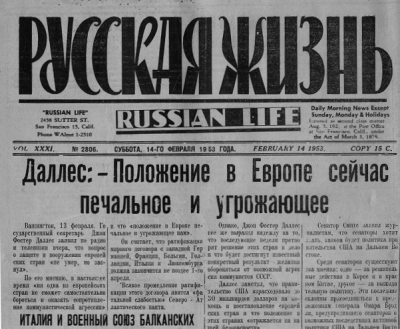|
Please note that this is not an
official website of the publication. |
|
NEWSPAPER
RUSSIAN LIFE IS CELEBRATING 90 YEARS OF PUBLIC SERVICE |
|
The year 2011
marks the 90th anniversary of continuous publication of the
newspaper Russian Life in San Francisco. When this newspaper was
fist published in 1921, radio broadcasting was just beginning,
television was a laboratory experiment, space flight and Moon
landings were subjects of science fiction novels. Even fantasy
writers did not imagine atomic weapons and the Internet. In 1921
in Constantinople, Gallipoli and on the island of Lemnos encamped
the Russian Army, evacuated from the Crimea, and the Russian Far
East Maritime region was still resisting the Bolsheviks. The
Solovki “special-purpose” concentration camp was only beginning to
perform its functions of extermination, and in the Crimea the
Bolsheviks were commencing mass executions of White Army personnel
who had trusted a false amnesty. In early1921 there was an
anti-Bolshevik uprising of sailors in Kronstadt, which was
suppressed by Tukhachevsky. In the same 1921 there was a mass
uprising of peasants in the Tambov province, also suppressed by
Tukhachevsky, using Chinese mercenaries and military poison gas
weapons – with a violence equal to the Nazi crimes in the occupied
territories. In 1921 the USSR did not yet exist, and just over two
years had elapsed since the November Armistice of 1918, which had
stopped the Great War. In Munich, an obscure former corporal of
the Kaiser’s army, Adolph Hitler worked as a secret agent for the
political intelligence section of the German General Staff… |
 |
|
In San Francisco,
the community of political refugees from Russia was growing, but
not all yet fully understood the complexity and consequences of
the catastrophe that had befallen Russia. Time and tragic reality
have placed many things in their place. The newspaper Russian Life
became one of the keepers of the traditions of free Russian
journalism and not only a medium to inform the readership, but
also a chronology of the many decades of life and work of the
Russian Diaspora in the USA. Today, at age 90 this newspaper
survives as the oldest, continuously published newspaper of the
Russian national Diaspora in the world. In Russia proper, it seems
that only the newspaper “Izvestia” has a longer lifetime of
uninterrupted publication (since March of 1917.)
|
|
The age of the
“Russian Life” includes entire layers of history: the creation of
the USSR; the inter-war period; Leninist and Stalinist terror in
the USSR; the persecution of religion; World War II; the Cold War
and the conflicts in Korea and Vietnam; the Communist takeover of
China; space travel; the evolution of computers; perestroika and
the disintegration of the USSR; the genesis of post-Soviet Russia;
the terror of September 11, 2001 and the struggle with global
terrorism. It is necessary to explain the business side of the
publication of Russian Life. The publication of a newspaper of
this profile cannot be subject to simple commercial priorities.
The main principles of the publication are informational
satisfaction for the readers, full publishing and editorial
independence, objectivity, a careful fulfillment of the mission of
chronicler of the community.
The regular revenue of the publication consists of subscription
fees and modest income for advertising. Subscribers of Russian
Life live in California and many other states of the USA, in
Canada, Australia, Brazil and other countries. The expenses of the
newspaper have been reduced to a minimum. The editors work for
free, the technical staff receives such small pay, that their
efforts to produce the newspaper every week are in effect also a
charitable contribution to the common goal.
|
 |
|
Therefore, the
newspaper is published now for decades with a substantial annual
deficit. How is this significant operational deficit covered? From
time to time, the newspaper receives gifts from readers, who
consider the existence of Russian Life sufficiently important for
our now world-wide community. For example, we remember with
gratitude the generosity of the late A.M. Poniatoff (†1980),
founder of Ampex Corporation in the Silicon Valley, who bequeathed
a significant sum to the newspaper. Such gifts feed a dwindling
reserve, from which the operational deficit of the newspaper is
covered. But this reserve is not infinite, and today one can
calculate mathematically the date, when it will be necessary to
“turn off the lights in the editorial office,” unless generous
support is received from those, who are not indifferent to the
fate of the newspaper. We sincerely hope that the 90th year of
publication will not be the last for Russian Life. To continue
publishing, the newspaper needs material help from friends and
readers. How should such help be manifested? In the first place,
all who read the newspaper should become regular subscribers. The
price is moderate and different periods are available.
Subscription revenue covers approximately one-half of each issue’s
production and delivery expenses. This means, each second issue of
the newspaper is in fact a gift to the subscribers. Secondly, all
friends of the newspaper are asked to make monetary gifts to the
newspaper, so the financial reserves of the publication increase,
instead of decreasing. No only the survival of the newspaper but
also its independence and objectivity depend on community support.
The newspaper cannot solicit grants from anyone and at the same
time claim full independence – and we believe that the
independence of Russian Life is a key attribute of its community
significance. |
| |
|
|
|